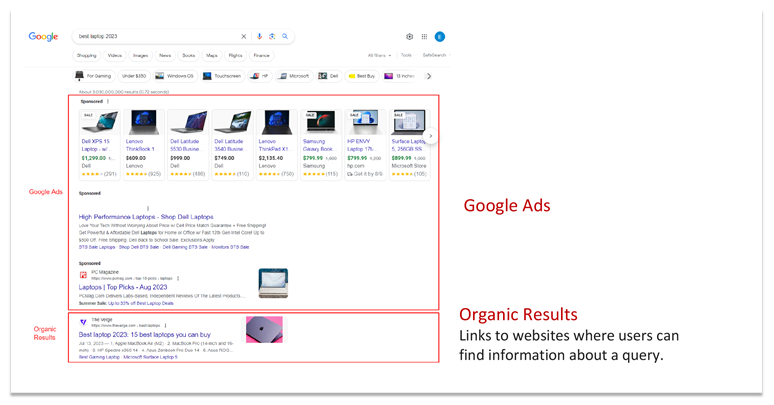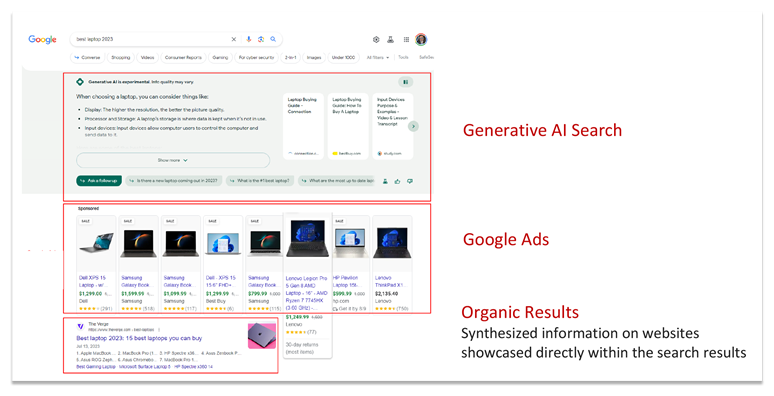Google’s New Generative AI Search Results
In May, Google announced a significant update and change to their Search Results, which they’re calling “Generative AI Search”.
Google claims that Generative AI Search will take “more of the work out of searching, so you’ll be able to understand a topic faster, uncover new viewpoints and insights, and get things done more easily.”
AI Search accomplishes this task by reviewing the content found on websites featured in Google’s traditional search results, then summarizing that material and presenting it directly within Google’s results, saving users from having to click through to websites to get the information they are seeking.
In theory, this sounds beneficial for users, but Search industry experts are concerned that this change could reduce click-through-rates from Google’s search results, impacting both paid and organic search performance.
A recent CNBC article summarizes these concerns as follows:
- Google is testing a Search Generative Experience that could show some users paragraphs of AI-generated text and a handful of links at the top of the results page, instead of the traditional list of blue links.
- Website publishers are already worried of SGE becomes Google’s default way of presenting search results, it could hurt them by sending fewer visitors to their sites and keeping them on Google.com.
- Some publishers are wondering if they can prevent AI firms such as Google from scrapping their content to train their models.
At USIM, we expect the introduction of Generative AI Search to have at least some impact on both paid search and organic search performance, and we’re anticipating seeing a slight decrease in click-through rates for both channels at introduction.
Why? Because AI-driven search results provide much more information directly on Google.com, with content designed to answer questions and give details that would have previously required users to visit publisher websites.
The screenshots below illustrate the differences between Google’s traditional results and Generative AI Search results:
Google’s Traditional Search Results

Google’s Generative AI Search Results

So far, Google appears to only be testing Generative AI Search results with opted-in users, but we expect them to begin testing the results on all users soon. We’ll continue to monitor the situation and provide updates as further details emerge.
For now, our advice is as follows:
SEM Next Steps
- Monitor the following metrics:
- Click through rates (CTRs)
- Impression share
- Top impression share
- Monitor search term reporting, looking for longer queries, and more sentence-structured questions as users adapt their input to the new search results.
- Consider how keywords may need to evolve to best match the new results.
- Continue to utilize robust negative keyword lists to prevent irrelevant search term matching.
SEO Next Steps
- Monitor the following metrics:
- Keyword rankings
- Keyword referrals, impressions, and clicks (via Google Search Console)
- Conversions and conversion rates (especially for niche topics)
- Update your keyword research data after Google fully implements AI results, checking search volumes regularly to look for changes in user behavior.
- Ramp up content development and consider targeting “hyper” long-tail search terms, including queries with multiple variables, like:
- “Best vegan restaurants in Los Angeles for large groups”
- “Best pest control companies in San Diego who treat for termites”
- “Best laptops for gaming with 16gb of ram and a number pad”
- Don’t be afraid to produce content targeting niche, lower-volume search queries, especially topics that have proven to convert well
